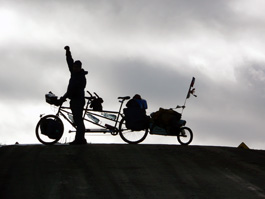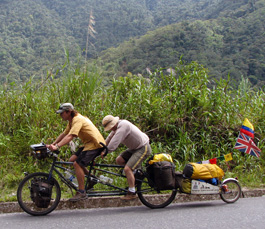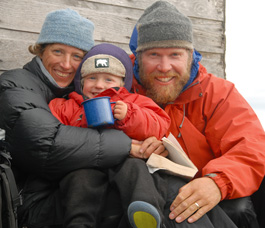home | north bay bohemian index | news | north bay | feature story

SILHOUETTE: Englishman Dominic Gill rode 18,000 miles on his tandem.
Changes in Latitudes, Changes in Attitudes
Banff doc 'Take a Seat' a lesson in human kindness
By Maria Grusauskas
In June 2006, 25-year-old Dominic Gill set out solo from northern Alaska on a tandem bike dubbed Achilles and headed south. Way south. His goal: to reach the southern tip of South America in 18 months, picking up random strangers to pedal the second seat along the way. Armed with bear spray, a video camera and a questionable sense of sanity, Gill rolled out of Prudhoe Bay, Alaska, and into the bleak tundra with a small British flag fluttering encouragingly behind him. He had just one rule: "I never asked anyone to get off!"
Along the 18,000-mile-long journey, he was chased out of town by a man with a machete, pedaled through snow storms and deserts, encountered landslides and scorpion-strewn beaches and picked up 270 "stokers" who mounted Achilles' open back seat to help him push—generous volunteers, since Achilles and its trailer of provisions tipped the scales at 220 pounds. Their contribution made a deep impression on Gill.
"I knew this challenge would be tough. I knew I would see incredible places. I knew I would experience fear, sadness, loneliness and sometimes delirious happiness," Gill says. "What I didn't expect was to have my faith in humanity so massively reinforced over two years of trusting in people."
The record of his journey is his documentary, Take a Seat, which won the Special Jury Award at the Banff Mountain Festival 2009. The film will show in San Rafael when the Banff Fest rolls into town March 8–9.
Born and raised in England, the self-proclaimed adventurer, climber and videographer dreamed up this human power journey after realizing his responsible 9-to-5 desk job as an environmental consultant was sucking the life out of him. Tired of working with large corporations that weren't interested in environmental improvement if it didn't save them money, and in possession of degrees in biology and environmental studies that weren't being put to use, Gill left the world of business in search of something more meaningful. Drawn by the sprawling expanse of the American continents, he combined the three things he loved—adventure, video and physical challenges—into the experience of a lifetime: a filmed journey down the entire western latitude of the Americas.
"This idea was conceived always with filming in mind. I'd be a fool to pass up an opportunity to document not only the places but the people I encountered while I rolled south," he says.
Ed Stobart of Ginger Productions, a documentary film producer, liked Gill's idea but asked him to add a twist to make it "crazy enough" to entertain viewers: do it on a tandem bike. Gill accepted.
As expected, the spare seat on Achilles added a dimension of unpredictable possibility, one that would alter his itinerary completely.
"After an initial plan of 18 months, I soon realized that rushing south was a waste of an opportunity to get to know people and places," says Gill. He scrapped any sort of strict cycling regimen and slowed his pace to savor the scenery and the rich company of new friends.
"In a world where there is so much fear and you are encouraged not to even get involved with your neighbors, it was life-affirming," he says. From its initial timetable of 18 months, the trip swelled to 26 months and became a completely different kind of journey.

PUSH: The conceit was to have strangers take the tandem's second seat on Gil's two-year adventure.
Stoked
Who were the lucky (or unlucky) 270 who took a seat?
"Curious city dwellers who invited me to stay, tourists wanting to go anywhere, anyhow with a cowboy hat and a few bags of herb, or a Peruvian villager welcoming an alternative to the overcrowded and unreliable rural bus service," he recalls. "In South America, kids would jump on whenever the hell they wanted."
A number of people found him online before they found him on the roadside, like Jules Kresko, a flight attendant from Colorado who overheard some people chatting about Gill in a bike shop. She rode with him for six weeks.
Yet two people on a tandem can be a hard lesson in patience. "As soon as they get a sore ass they start moving around and it makes for really hard pedaling," he says. There were only a few stokers he didn't get along with, and in such cases he found ways to trick his own system—not directly asking them to get off but using "hen-pecking comments" to inspire their fold.
The female-to-male ratio of guest riders was 60/40. "I guess something about tandems is particularly attractive to women," Gill muses. Add a pair of tight bike shorts and a charming British accent to the machine and the mystery dissolves.
But it wasn't all fun and companionship. Gill pedaled about 50 percent of the miles alone, enduring long stretches of loneliness. Like the day of his 26th birthday, when he crashed Achilles in the middle of nowhere and later realized his wallet was missing. Or the freezing nights he spent in his tent waiting out the snowstorms in southern Chile, or the endless expanses of high-altitude desert in Peru. "It was like a scene out of a Dali painting," he says of the landscape 15,000 feet above sea level, where night temperatures plunged to minus 13 degrees. Some of these moments are documented with raw honesty in Take a Seat, but his journal offered the real asylum. "Writing kept me sane," he says. "It was constant."
Border Bound
Gill rolled down the Northern California coast in October 2006. The empty saddle created a kind of social experiment. Although he found a healthy supply of friends in California, Gill apologetically admits to registering a sort of phoniness, what he called "too much money and not enough brain, and a lot of attitude," which intensified the farther south he got.
He was also getting nervous as he pedaled through Southern California. Five thousand miles of warnings about banditos, pickpockets and murderers waiting for him in Mexico left Gill cycling toward the border with his fight-or-flight instinct fully engaged. He crossed into Tijuana with vivid scenarios of being robbed flashing in his brain. What he found was a far cry from the worst he had expected: some new friends and a place to sleep.
"Marco Kelly sold tacos from his stand and his 'loncheria' around the corner. He spoke English, French and Spanish perfectly and provided me with more than a soft landing in Mexico," Gill says.
What started with tacos and friendly conversation turned to shelter and company for Gill's first night south of the border. His blog recounts: "He instructed his incredibly able cook Esmaralda to feed me with delicious tacos, and there, in fading light, on a busy street, sitting on a stool next to a filthy but functional mechanics shop, a love affair started. Not with Esmaralda, but with tacos. I love them more than life itself. Simplicity. Satisfaction. Perfection in a moist tortilla."
Southern Hospitality
In Latin America, he was invited to family celebrations, offered homes and yards and even a schoolhouse to sleep in. One of the most destitute areas he passed through was Pisco, Peru, months after it was shaken by a devastating earthquake. "There were areas that smelt of death, bodies still under the rubble and people living in tents," says Gill. But it was there he remembers a local soft drink truck stopping on the road to hand him a Coke.
"I spent three days in Honduras, and on the second day a family took me in and treated me like one of their own."
Such generous hospitality also meant eating what the locals ate. With a family in Ecuador, Gill helped to slaughter guinea pigs, a delicacy reserved for celebrations. "After which the lady of the house painstakingly cleaned the intestines with a knitting needle," he remembers. Whether it was crickets or cow stomach in Mexico, sheep's-head soup in Peru or days of nothing but stale bread and sardines in the Bolivian desert, Gill survived on whatever opportunity offered him. When he could, though, he would stock up on mayonnaise and pasta; the concoction, he says, tasted "like coming home to my favorite meal."
The most challenging element of his trip began to take on a new form. Saying goodbye to that kind of friendship and hospitality produced an emotional exhaustion that brought him close to quitting the expedition on more than one occasion. It was a feeling he didn't want to get used to.
A Story to Tell
In August 2008, Dominic rolled into the icy city of Ushuaia in Patagonia's Tierra del Fuego ("Land of Fire"), named for the cooking fires seen burning on the beaches by Magellan and his crew five centuries ago. It was the end of an incredible journey, but the joy he had anticipated was absent. Instead, an emptiness filled him where every day there had been new people and places to meet.
"Here [South America], I am different. I'm almost blonde and I've got a story to tell. But when I go home, I'm just going to be me. Walking down the street ... without a bicycle," Gill told the camera.
A year and a half later, more than 200 hours of film footage, an extensive journal and scores of new friends have enabled him to bring part of that story with him. Two years after the adventure ended, Dominic Gill is pinching pennies, but he hasn't yet succumbed to the 9-to-5 grind. He has, however, returned to the world of business.
"I've turned what I loved into my work—which was the goal, for good or for bad," he says. His book, a compilation of the image-rich prose of his journal and blogs, will be published in May of this year.
And Achilles? Sitting in his aunt's house, reconditioned and ready for a book tour around England.
'Take a Seat' screens March 8.

From the film 'Finding Farley,' Photo by Karsten Heuer
Action!
By Curtis Cartier
Now in its 34th year, the Banff touring festival hits 285 cities and towns annually. Starting this year's offerings on a bit of a ridiculous note, The Ultimate Skiing Showdown (March 8) is set to the Neil Cicierega song "The Ultimate Showdown of Ultimate Destiny," which discusses a fight between Batman and Godzilla. David McMahon's four-minute goof pays both homage and insult to the sport of cross-country—ahem, Nordic—skiing. While the silly song plays, a group of trick-happy skiers bothers, surprises and generally acts the fool in front of a less talented but seemingly reasonable group of skiers.
Among other highlights is Finding Farley (March 8; below). Filmmakers Karsten Heuer and Leanne Allison chart a course across the Great White North using locales that Canadian author Farley Mowat brought to life in famous nature tales like Never Cry Wolf. With their two-year-old son Zev and spunky dog Willow, the family sets out on a quest to meet Mowat himself in Nova Scotia.
The quirky MedeoZ (March 9) brings back the high-octane action. In this film, a photographer tries to take a single photo of six different mountain sports: skiing, snowboarding, mountaineering, paragliding, speed riding and BASE-jumping. Pulling off the feat isn't easy, and director/protagonist Guillaume Broust has to marshal not only timing but egos as the six extreme disciplines come together behind one lens.
First Ascent: Alone on the Wall (March 9) tells the story of a young and possibly psychotic man named Alex Honnold who lives in a van. Traveling from rock climb to rock climb, the fearless 24-year-old sacrifices home cooking and hygiene for his stony relationship with sheer mountain walls. His holy grail: to climb Yosemite National Park's legendary face Half Dome with no ropes and nothing to save him should he lose his grip. Honnold says he climbs best without ropes. He'll have to—one slip and all that will be left of our hero is a smudge at the bottom of the mountain and a scary story climbers tell their children.
Rush Sturges' Africa Revolutions Tour (March 8) shows what kind of trouble a group of kayakers can get into in Uganda and Madagascar. In many cases, the crew of river rats represents the first lunatics to ride the crocodile- and wasp-infested rivers in kayaks. The white-knuckle action is undercut by group companion Rita Riewerts and the Sun Catchers Project, which gives simple, solar powered ovens to rural villagers to use for cooking and sanitizing water.
Banff screens Monday–Tuesday, March 8–9, at 7pm at the Smith Rafael Film Center. $18 per night. 1118 Fourth St., San Rafael. 415.927.1938.
Send a letter to the editor about this story.
|
|
|
|
|
|